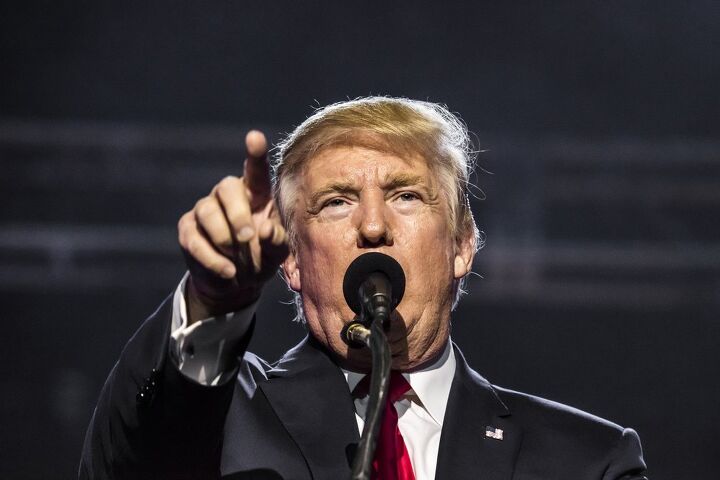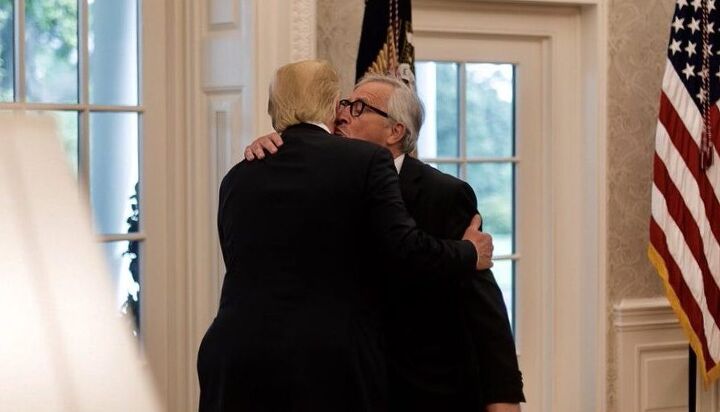#TradeDeals
Auto Lobbyists Attempt to Soften USMCA, Look to White House [UPDATED]
Lobbyists are reportedly seeking to soften the United States-Mexico-Canada Agreement (USMCA) now that there are some new faces in the White House. Signed in 2018, revised in 2019, and effective since 2020, the USMCA sought to restore North America’s manufacturing base with new content requirements and place the United States in a more favorable position than it held under the North American Free Trade Agreement. But industry groups are now claiming that interpretations from government agencies are gumming up the works, and accusing the U.S. of having a different interpretation from what the other nations had originally agreed upon.
“[The USCMA interpretation makes] meeting the … content provisions that much more difficult for everyone to achieve,” stated David Adams, president of Global Automakers of Canada.
Back to Normal: U.S. Auto Tariff Threats Return for EU
On Wednesday, President Donald Trump threatened to impose fresh tariffs on European automotive imports if the region can’t work out a trade deal with the United States. The good news is that the U.S. is already in the opening stages of negotiation with the United Kingdom, which is due to leave the EU at the end of January. British Prime Minister Boris Johnson has even said a key benefit of Brexit is the ability to negotiate with countries like the U.S. independently.
Unfortunately, the rest of Europe doesn’t seem as eager to do business — encouraging Trump to fall back to tariff threats. But there’s clearly a retaliatory angle here. In 2018, the EU threatened punitive tariffs on traditionally American items like whiskey and motorcycles as a response to Trump’s intent to impose tariffs on steel and aluminum. He’s targeting French goods this time, mentioning 100-percent fees on imported luxury goods from France (champagne, handbags, etc.), additional levies on digital services, and a 25 percent duty on European cars.
No New Auto Tariffs For Japan, Probably
The United States and Japan have signed a limited trade deal that’s been simmering for some months now. President Donald Trump has been eager to secure a place where American farmers can send their goods now that the trade war with China has diminished American dealings with that market. In return, Japan wanted assurances from the U.S. that it will not impose any new automotive tariffs, as cars remain one of its chief exports.
While the island nation didn’t get the guarantee in writing, Prime Minister Shinzo Abe claims he received a verbal promise. This is to be the first part of a broader trade deal between the two countries.
Japan Eyeballs Minor Trade Deal With U.S. Slated for September
The United States and Japan are working on a trade deal revolving around agriculture and automobiles. As much as you’re probably dying to hear about the farming aspects, we’re going to focus a bit more on the latter. Boiled down, the arrangement is reported to deliver preferential treatment for U.S. farmers hoping to expand into the Japanese market while lessing duties on Japanese auto parts.
President Donald Trump has noted in the past that he’s displeased with any country holding a trade surplus over America’s head and Japan has one. Last year, it amounted to $67.6 billion in goods — most of it relating directly to automobiles. This initially encouraged the president to threaten tariffs on Japanese imports. However, Japan’s close ties to the United States bought it some time and any legitimate danger has been postponed to encourage trade discussions.
U.S. Trade Head to Meet With UAW This Week Over New Trade Deal
U.S. Trade Representative Robert Lighthizer will be in Michigan this week to meet with union leaders from United Auto Workers in a bit to gain their approval for the Trump administration’s new North American free trade deal. Lighthizer is scheduled to meet with union officials in Dearborn on Tuesday to answer questions about the United States-Mexico-Canada Agreement (USMCA) while simultaneously drumming up support.
The USMCA deal suggests increasing existing requirements for North American content for vehicles, stipulating that 40 percent of a vehicle’s overall content be manufactured in areas paying at least $16 an hour, while also encouraging Mexico to tailor its labor rules to allow unions to wield legitimate collective bargaining powers.
Ford Threatens to Pull Out of the United Kingdom
Ford Motor Company has reportedly informed British Prime Minister Theresa May of its tentative plan to move out of the United Kingdom. The automaker explained the situation to May during a private call with business leaders tasked with assessing how Brexit might impact the economy. Ford said it was already preparing to move its facilities — which include two engine plants, a transmission factory, and an R&D center — abroad.
With the European Union and British government still unable to establish trade terms, automakers are having a panic attack. Ford later told Reuters that a no-deal Brexit would be catastrophic for its European-based businesses, citing earlier claims that it would cost the manufacturer up to $1 billion.
Automakers Understandably Freaking Out Over 'No Deal' Brexit
With Britain’s parliament rejecting Prime Minister Theresa May’s latest Brexit deal, European automakers stand to face some strong headwinds in the near future. As of now, no clear path lies ahead. Many believe the European Union will continue playing hardball, punishing Britain for leaving. But, even if it doesn’t, loads of regulatory and trade issues must be resolved in short order to avoid problems.
There’s also no shortage of hyperbole surrounding the issue. Just this morning I heard cable news call it “the largest crisis in Britain’s history,” as if World War II never happened. A channel away, another outlet proclaimed how splendid it would be for trade between the United Kingdom and United States.
Regardless of which side of the fence you fall, there’s more at stake here than Theresa May’s job. Automakers, who like consistency above all else, worry a no deal plan for “British independence” could be tantamount to flipping the industry table. They don’t like being caught up in the uncertainty surrounding Brexit, and there appears to be an endless list of issues to contend with.
Trade War Watch: Trump Reportedly Delaying Auto Tariffs, Clock Still Ticking
The Trump administration was supposed to make an announcement Tuesday as to whether or not imported automobiles pose a national security risk, following discussions with trade representatives. While it wasn’t presumed that the White House would say anything truly definitive or hold a formal press conference on the issue, it was assumed that the president would take a stronger public stance either for or against an earlier proposal to raise foreign auto import tariffs to 25 percent. And it has, in a way.
According to those familiar with the matter, the White House decided to postpone any major decisions after discussing a draft Commerce Department report on the impact of auto imports with trade reps. However, the administration doesn’t have forever to make up its mind. Nor does its trading partners, which could be the point.
NAFTA No More: U.S. Reaches Deal With Mexico, Puts Pressure on Canada [Updated]
President Donald Trump announced a trade “understanding” with Mexico on Monday — not to be confused with an official deal — that would lead to an overhaul of the North American Free Trade Agreement. Trump made the announcement from the Oval Office, with Mexican President Enrique Pena Nieto listening in by speakerphone.
While it’s still too early to show up in a Lockheed S-3 Viking and tell the world “mission accomplished,” the announcement is the most overt example of progress on NAFTA we’ve seen. Interesting, considering it seemed as if Trump was openly calling for its death during the meeting.
Earlier in the day, Mexican officials said trade talks with the U.S. had concluded, adding that an announcement could come later in the day. The White House confirmed the reports an hour later on its government website, with Donald Trump stating there was a “big deal looking good with Mexico” via twitter.
Obligatory NAFTA Update: Mexico and Canada Reject U.S. Proposals as Talks Wrap Up
As the fifth round of NAFTA talks come to a close, Mexico and Canada continue to reject the United States’ demands regarding automobiles, diary, dispute panels, government procurement and the sunset clause. Among the more recent automotive proposals kicking up dirt is the U.S.’s wish to include steel in NAFTA’s tracing list and increase the mandatory local content of every car built in North America. The attempt has annoyed foreign officials and left the industry fretting about increased production costs and complexity.
The increasingly tense nature of the talks has left many wondering if President Trump will make good on his earlier threat to leave NAFTA. However, plenty of analysts are of the mind that a deal will eventually be reached between the three countries.
Ending NAFTA Could Cost U.S. 50,000 Auto Jobs: Study
Automotive trade groups have issued warnings about the scrapping of the North American Free Trade Agreement all year. In January, the Center for Automotive Research claimed killing NAFTA could result in the elimination of at least 31,000 auto jobs within the United States. This week, a new study sponsored by the Motor Equipment Manufacturers Association upped that estimation to around 50,000.
With early negotiations not going particularly well at the moment, the new tally serves as a potential warning. If NAFTA is abandoned, North American countries would all likely revert to rules dictated by the World Trade Organization, resulting in higher tariffs from all sides.
While 50,000 fewer jobs is the upper echelon of what could be expected, a few things have to go wrong for it to reach that point. First, Mexico and Canada would have to revert to pre-NAFTA tariff levels — which were comparably higher than the United States. If so, manufacturers would almost assuredly begin sourcing more parts from the same countries where the vehicles are assembled, and gradually move production to lower-cost regions like China.
No Deadline for NAFTA Talks Despite Industry Plea for a Quick Turnaround
U.S. Trade Representative Robert Lighthizer said on Wednesday there was no definitive timeline for completing NAFTA trade renegotiations. Discussions haven’t even begun between the United States, Canada, and Mexico but legislators and executives have already warned prolonged negotiations would likely be detrimental to their interests.
The automotive industry is mainly seeking a swift and unambiguous update that doesn’t rock the boat too severely. Every day there is no consensus on the trade agreement is another day it has to postpone large investments. Ideally, the U.S. wants the redrawn NAFTA to prioritize its workforce and industry, while the Trump administration aims to tax imports and force companies to do more business within its borders. But, with nothing finalized, many automakers are in a holding pattern. Volkswagen, for example, is putting off decisions on major U.S. investments until it becomes clearer what course NAFTA will take.
Ford Has a Few Pointers for Trump as NAFTA Negotiations Loom
Ford Motor Company thinks it has the answers for the impending renegotiation of the North American Free Trade Agreement. Joe Hinrichs, Ford’s president of the Americas, believes the key to an updated NAFTA includes protections against currency manipulation and the standardization of product regulation between the United States, Canada, and Mexico.
Of course, Hinrichs is just one voice of many. Despite his initial threat of NAFTA’s abolishment failing to pan out, President Trump has maintained a hardline stance — stating he will negotiate a better deal for the U.S. (or pull out if he can’t). Meanwhile, Democratic Senator Sherrod Brown has urged for transparency throughout the process while echoing some of Trump’s campaign promises to stick up for American jobs by not showing favoritism or allowing industries to play against each other.
By contrast, Hinrichs’ proposals are specifically focused on streamlining the auto industry and avoiding long-standing complications associated with financial witchcraft.



![Auto Lobbyists Attempt to Soften USMCA, Look to White House [UPDATED]](https://cdn-fastly.thetruthaboutcars.com/media/2022/07/19/9146752/white-house-invites-auto-execs-to-endorse-build-back-better.jpg?size=720x845&nocrop=1)







![NAFTA No More: U.S. Reaches Deal With Mexico, Puts Pressure on Canada [Updated]](https://cdn-fastly.thetruthaboutcars.com/media/2022/06/30/8798011/nafta-no-more-u-s-reaches-deal-with-mexico-puts-pressure-on-canada-updated.jpg?size=720x845&nocrop=1)
















Recent Comments